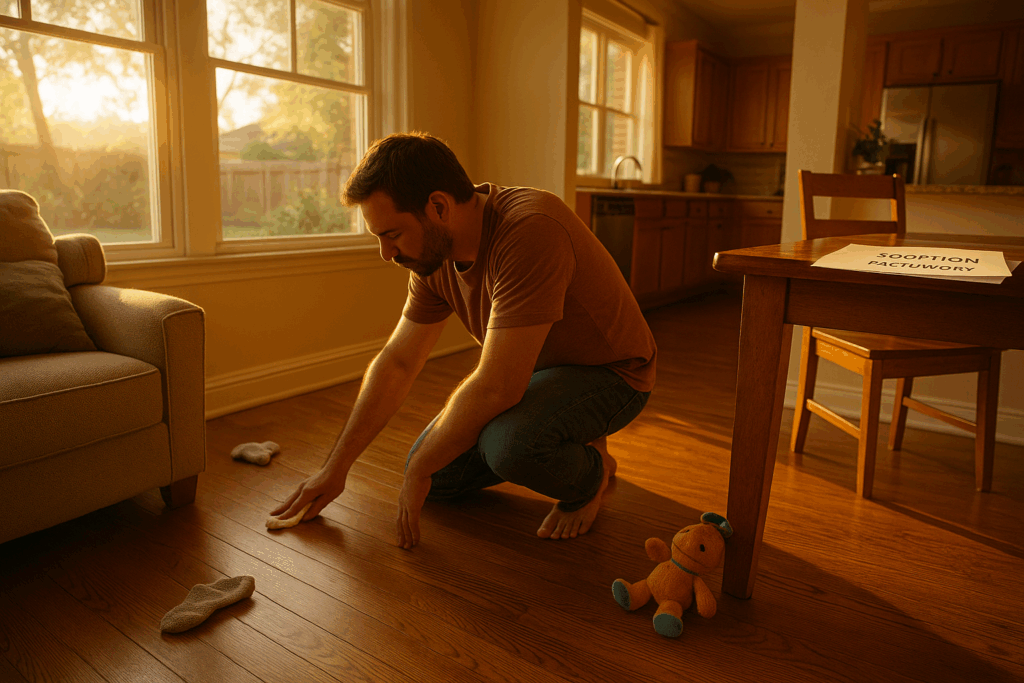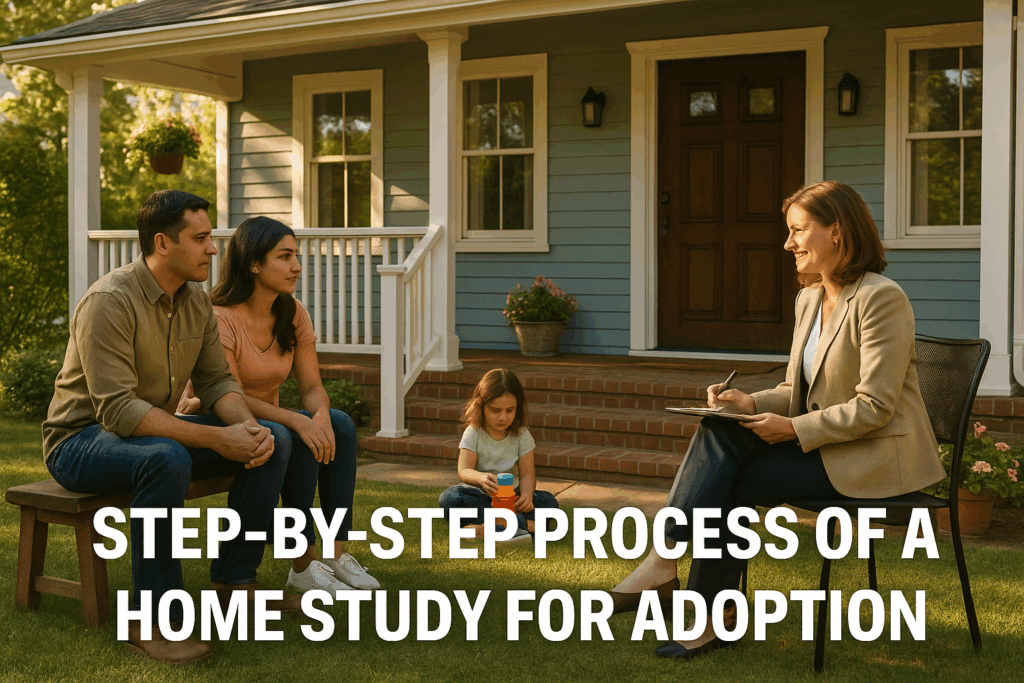
If you’ve ever found yourself scrubbing the baseboards at midnight or wondering whether a stray sock under the couch could ruin your chance to adopt, you’ve probably already asked yourself what is a home study in a Texas Adoption—and you’re in good company. In short, it’s a required legal process where licensed professionals evaluate your home, background, and emotional readiness to ensure a child will be placed in a safe and loving environment.
But don’t worry—this isn’t some white-glove test of perfection. It’s a structured, step-by-step way for the state of Texas to confirm you’re ready to open your home and your heart to a child. In this article, we’ll walk you through everything you need to know: from the laws that govern home studies to what social workers are really looking for (hint: it’s not flawless decor). We’ll also cover different types of adoption, potential roadblocks and how to overcome them, and how to protect your child’s education and emotional well-being during a divorce or custody situation.
You’ll hear real-life examples, learn practical tips to reduce stress, and discover why working with The Law Office of Bryan Fagan, PLLC can make this journey smoother. So whether you’re just getting started or knee-deep in paperwork, take a deep breath—we’ve got you covered.
Key Takeaways
- A Texas adoption home study is essential for assessing the readiness of prospective adoptive parents, involving interviews, inspections, and background checks.
- The home study’s primary purpose is to ensure a safe and nurturing home environment for a child, culminating in a detailed report required for adoption finalization.
- Preparatory steps for a home study include gathering documents, preparing for interviews, and being open during the process to foster a positive relationship with evaluators.

Your Adoption Journey Starts Here
Don’t navigate the adoption process alone. Schedule a consultation today and receive the expert guidance and support you need to build the family of your dreams.
What is a Home Study?
In Texas, answering the question what is a home study in a Texas Adoption means understanding a legally mandated and deeply personal process designed to ensure that every child is placed in a safe, stable, and nurturing environment. Under Texas Family Code § 162.003–§ 162.009, a home study is a required evaluation for most adoption types—whether private, kinship, or foster-to-adopt—and must be completed before a court can finalize the adoption.
The process includes several key components: interviews with all household members, thorough documentation reviews, background checks for anyone over age 14 residing in the home, and a full safety inspection of the physical home environment. These steps allow licensed evaluators to assess not only the home’s physical safety but also the emotional and financial readiness of the adoptive parents.
Texas adoption home studies are not designed to intimidate—they’re in place to protect children and set families up for success. The evaluation often includes conversations about parenting style, discipline strategies, motivations for adoption, and the support systems available to the adoptive family. As our family law team often advises, preparing for this step with honesty, organization, and openness goes a long way toward building trust with your evaluator.
For families who are further along in their adoption journey, it’s important to stay informed about what comes next. We recommend reviewing this guide on Texas post-adoption requirements to understand your ongoing responsibilities.
You can also explore our related blog, Kinship Adoption in Texas: Legal Steps and Emotional Readiness, which provides valuable insights for extended family members seeking to formalize their role in a child’s life.
Whether you’re just beginning or ready for your final court date, our attorneys are here to provide guidance rooted in compassion and backed by deep experience in Texas family law.

The Purpose of a Home Study
When exploring what is a home study in a Texas Adoption, it’s important to understand that this process is a legally required safeguard, designed to ensure a child’s safety and long-term well-being. According to Texas Family Code § 162.003 and related provisions, the home study functions as a comprehensive pre-adoptive evaluation. It assesses the prospective parents’ ability to provide a stable, nurturing environment by reviewing their background, home conditions, emotional readiness, and financial stability.
The final product of this process is a detailed written report, which includes summaries of family interviews, criminal background checks, and a professional recommendation on the family’s suitability to adopt. This report must meet all legal standards before the court can approve the adoption, making it one of the most critical steps in your journey. Whether you’re adopting in Houston, Poteet, or elsewhere in Texas, the legal and emotional weight of this evaluation should not be underestimated. You can learn more about regional adoption support in Poteet, Texas.
As our team often advises, preparing early and seeking experienced legal guidance can ease the process and help avoid costly delays. For a deeper look at family-based placements, visit our internal guide on Kinship Adoption in Texas. With compassionate, knowledgeable legal support, you can feel confident that your home study will be a strong foundation—not a hurdle—in your adoption journey.

Key Elements Evaluators Look For
When asking what is a home study in a Texas Adoption, it’s essential to understand that this process is more than just a walkthrough of your home—it’s a comprehensive evaluation of your family’s ability to meet a child’s physical, emotional, and developmental needs. In accordance with Texas Family Code § 162.003 and § 162.0085, evaluators are tasked with ensuring the environment is free from hazards, with safety features like functional locks, smoke detectors, and secure storage for medications or hazardous items. They’ll also review financial documents such as recent tax returns and bank statements to confirm that the adoptive parents can provide for the child without placing the household under financial strain.
Emotional readiness is another crucial part of the assessment. Evaluators consider your motivation for adopting and your preparedness to navigate the highs and lows of parenting—especially in cases involving children who may have experienced trauma. These conversations can feel personal, but they’re designed to ensure that adoption is being pursued for the right reasons and that the home offers long-term emotional stability. For prospective grandparents seeking to adopt a grandchild with special needs, these assessments carry added weight, and we recommend reviewing our detailed article: Texas Adoption Guide: What Is Required in Texas Law to Adopt Your Special Needs Grandson.
In compliance with Texas law, all household members age 14 and older must undergo criminal history checks, including fingerprinting and a central registry background check. These measures help ensure that the child will be placed in a safe and secure home. For more insight into the legal and emotional aspects of intrafamily adoption, our blog on Kinship Adoption in Texas offers a helpful starting point. As our legal team often emphasizes, a well-prepared family supported by experienced counsel can approach the home study with confidence and clarity.

The Home Study Process Step-by-Step
The home study process is a structured journey designed to assess and prepare prospective adoptive parents. It begins with an application process and concludes with a comprehensive report on adoption home studies.
Let’s delve into the specific steps involved, from finding a provider to post-placement visits.
Finding a Provider
The first step in the home study process is finding a qualified provider. Prospective adoptive parents should submit their application to initiate the process. The home study provider will supply necessary background check forms and instructions, and may require completion of training courses to ensure parents are well-prepared.
Gathering Required Documents
When prospective parents ask what is a home study in a Texas Adoption, one of the most important steps they can take is gathering the right documentation early in the process. Under Texas Family Code § 162.0085, a home study must include verified records such as certified birth certificates, employment history, and background checks for every household member age 14 and older. Getting these documents organized in advance helps evaluators complete their assessment without unnecessary delays—setting a strong foundation for the adoption journey ahead.
To stay on track, prospective adoptive parents should create a checklist and be prepared to upload key documents through their provider’s secure online portal. This often includes financial statements, medical evaluations, reference letters, and verification of homeownership or lease agreements. Staying proactive can make the process smoother and less stressful. If you’re looking for additional clarity on specific document requirements or timelines, we recommend visiting our Texas Adoption FAQs page for answers to the most common questions families ask.
Our family law team also suggests reviewing our guide to Texas Divorce Steps for Proper Service, which highlights procedural best practices that apply to both divorce and adoption cases. With proper legal support and early preparation, you can reduce the paperwork burden and focus on what truly matters—building a stable, loving home for your future child.

Preparing for the In-Home Interview
Preparation for the home visit is crucial. The social worker will meet with all family members and ask questions to assess the family’s ability to provide a stable, loving environment. Conducting a self-check of home safety and cleanliness beforehand can create a positive impression.
Reflecting on potential questions and practicing responses can also help in presenting oneself confidently during the interview. Ensuring basic safety measures are in place, such as secure window blind cords and household heating equipment, can demonstrate a commitment to a safe home environment and reduce safety hazards, including the importance of poison control.
Post-Placement Visits
Post-placement visits are conducted to monitor the child’s well-being and adjustment to the new family. These visits ensure that the child’s needs are being met and that the family is adapting well to the new dynamics, including post adoption services.
Feedback from CPS staff regarding the approval of the home study is provided, explaining the rationale behind the decision. Successful home studies can lead to approval for various caregiving categories, such as the foster care system or adoptive homes.
Common Concerns and Myths
A frequent misconception among prospective adoptive parents is that having a past criminal record will automatically disqualify them from completing the adoption process. In reality, under Texas Family Code § 162.0085, the nature, severity, and timing of the offense are all taken into consideration. A single misdemeanor from years ago—especially if it has been resolved and there’s been evidence of rehabilitation—may not prevent approval. Evaluators and courts are more focused on the child’s current safety and the stability of the home environment than a person’s distant past.
Another persistent myth is that your home must be spotless and picture-perfect to pass a home study. In truth, evaluators are not checking for pristine baseboards or matching furniture—they’re ensuring that your home is clean, safe, and equipped to meet a child’s needs. Likewise, health concerns are not automatic disqualifiers. Medical conditions are reviewed individually, and as long as they are properly managed and do not impact your ability to care for a child, they typically will not interfere with your ability to adopt.
If you’re still wondering what is a home study in a Texas Adoption and whether you’re a strong candidate, the best next step is to speak with an experienced adoption attorney. Our team is here to offer honest guidance and supportive legal solutions. You can contact us directly to schedule a consultation. We also encourage you to explore our blog on Texas Post-Adoption Requirements to better understand what comes after the home study. At The Law Office of Bryan Fagan, we believe the home study isn’t a judgment—it’s a gateway to opening your heart and home to a child who needs it.

Practical Tips for Preparation
Preparing for a home study professional involves practical steps such as gathering necessary documents early and staying organized. Using a home study checklist can help keep track of essential documents and ensure nothing is overlooked.
Being flexible and open during the process can help ease adjustments and speed up the overall timeline. Sharing personal stories and experiences during the home study can foster a deeper connection with the social worker, making the process feel more collaborative and less stressful.

Real Stories and Testimonials
Real client stories and testimonials highlight the positive experiences of families who have successfully completed their home study. One family shared how working with The Law Office of Bryan Fagan, PLLC made them feel supported and confident throughout their journey.
The Law Office of Bryan Fagan, PLLC provided clear guidance and reassurance, helping families navigate the complexities of the home study process. These testimonials illustrate the importance of dedicated legal support in successfully completing the home study and moving one step closer to finalizing the adoption.
Conclusion:
So here’s the real story: adoption isn’t about being perfect—it’s about being present, prepared, and willing to open your life to a child who needs love, stability, and a safe place to grow. If you’ve been wondering whether your home, your heart, and your timeline are “good enough,” take a breath. The fact that you’re researching what is a home study in a Texas Adoption already shows you’re heading in the right direction.
Whether you’re just beginning this journey or navigating it alongside a divorce or custody matter, know that you’re not alone. There are clear steps you can take, resources available to support you, and professionals—like our team at The Law Office of Bryan Fagan, PLLC—who are ready to walk with you, every step of the way. We help families across Texas not only complete their home studies, but build smart parenting plans, preserve academic stability, and advocate fiercely for what’s best for their children.
If you’re ready to take the next step, or even just need someone to talk to about what that step should be, we’re here for you. Book a consultation with our family law team today, and let’s talk about building a future that’s grounded in hope, structure, and care.
And hey—if your home isn’t Pinterest-perfect, that’s okay. No judge or social worker ever denied a loving parent because the laundry wasn’t folded. What matters most is the love you’re ready to give. Let’s get started.
Frequently Asked Questions About Texas Adoption Home Studies
A home study for adoption in Texas is a legally required evaluation that assesses whether prospective adoptive parents can provide a safe, stable, and nurturing environment for a child. It involves background checks, interviews, a home inspection, and a final written report submitted to the court.
During an adoption home study, a licensed evaluator will conduct interviews with all household members, perform a walkthrough of the home to check for safety and suitability, review documentation such as financial statements and medical history, and prepare a report evaluating the family’s readiness to adopt.
Typical questions asked during a home study include topics about parenting philosophy, discipline practices, relationship history, financial stability, motivations for adoption, and how the family plans to support the child emotionally, educationally, and physically.
Common reasons for failing a home study include recent criminal convictions, evidence of substance abuse, unsafe or unsanitary living conditions, lack of financial stability, or failure to complete required paperwork or training.
In Texas, a home study is generally valid for up to 12 months. If the adoption process takes longer or circumstances change significantly, the home study may need to be updated or renewed.
The cost of a home study for adoption in Texas typically ranges from $1,000 to $2,500 for private adoptions. Home studies conducted through state foster care systems may be covered or subsidized.
An adoption study example includes an evaluator’s written report that summarizes family interviews, documents the home inspection results, includes background checks, and provides a recommendation regarding the family’s readiness to adopt.
Yes, most adoption centers or licensed agencies conduct house checks as part of the home study. These checks ensure the home is safe and appropriate for a child, including functioning smoke detectors, secure windows, and sufficient living space.
In most cases, a home study is required for private adoptions in Texas. However, courts may waive this requirement in specific situations, such as stepparent or close relative adoptions, but legal counsel is necessary to pursue such a waiver.
Bryan Fagan is a Texas family law attorney with a heart for adoption—inspired not just by his legal career, but by his own family story. Growing up in Atascocita with two adopted brothers, Bryan learned early the profound meaning of chosen family. His passion for justice was sparked by John Grisham’s The Pelican Brief, and he became the first lawyer in his family, balancing night classes at South Texas College of Law while caring for his grandmother with Alzheimer’s.
Today, Bryan brings that same dedication to his practice, guiding families through adoptions, custody disputes, divorces, and complex marital agreements. A certified member of the College of the State Bar of Texas, he combines elite legal expertise with genuine empathy—drawing from his roles as a husband, father of three, and advocate for families facing false CPS allegations.
Based in Houston, Bryan is actively involved in the Houston Bar Association’s Family Law Sector and statewide family law organizations. Whether finalizing an adoption or protecting parental rights, he believes the law should reflect the deepest values of home, commitment, and love.

